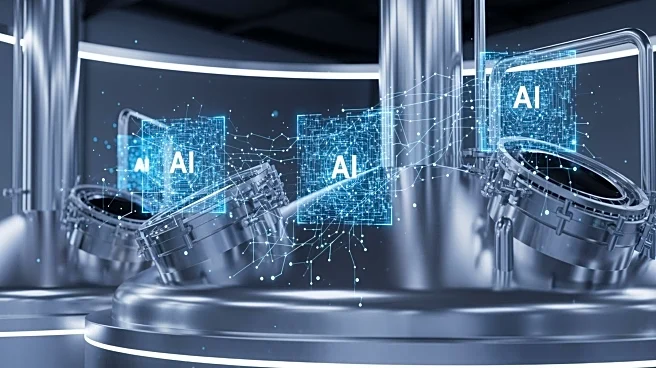What's Happening?
Yokogawa Electric Corp., in collaboration with Craft Bank Co., a Kyoto-based craft beer brewer, has successfully implemented an AI-driven approach to optimize the fermentation process of their Bank IPA
beer. The AI technology, known as Factorial Kernel Dynamic Policy Programming (FKDPP), is a reinforcement learning-based algorithm that autonomously controls the fermentation temperature settings. This innovative method reduced the fermentation time from 336 hours to 240 hours, marking a 28% decrease. The AI-generated temperature schedule was manually applied by the brewmaster, ensuring all quality criteria were met through sensory evaluations. This proof of concept demonstrates the potential of AI in enhancing manufacturing efficiency and quality.
Why It's Important?
The application of AI in the brewing process signifies a major advancement in manufacturing technology, particularly in the food and beverage industry. By reducing fermentation time, breweries can increase production efficiency and potentially lower costs, benefiting both manufacturers and consumers. This development highlights the growing trend of integrating AI into traditional industries to solve complex trade-offs and improve operational processes. The success of this initiative could encourage other sectors to explore AI-driven solutions, fostering innovation and competitiveness in the U.S. manufacturing landscape.
What's Next?
Following the successful proof of concept, Craft Bank plans to further explore AI-driven brewing techniques that are unique to their operations. This could lead to the development of new beer varieties and production methods, enhancing their market offerings. Additionally, Yokogawa's AI technology may be applied to other areas within the manufacturing sector, where complex decision-making and efficiency improvements are needed. The broader adoption of AI in manufacturing could drive significant changes in industry standards and practices.
Beyond the Headlines
The integration of AI in manufacturing processes raises important ethical and cultural considerations. As AI takes on roles traditionally held by skilled workers, there may be concerns about job displacement and the need for workforce retraining. Moreover, the reliance on AI for quality control and decision-making could shift cultural perceptions of craftsmanship and expertise in industries like brewing. These developments may prompt discussions on the balance between technological advancement and preserving traditional skills.










